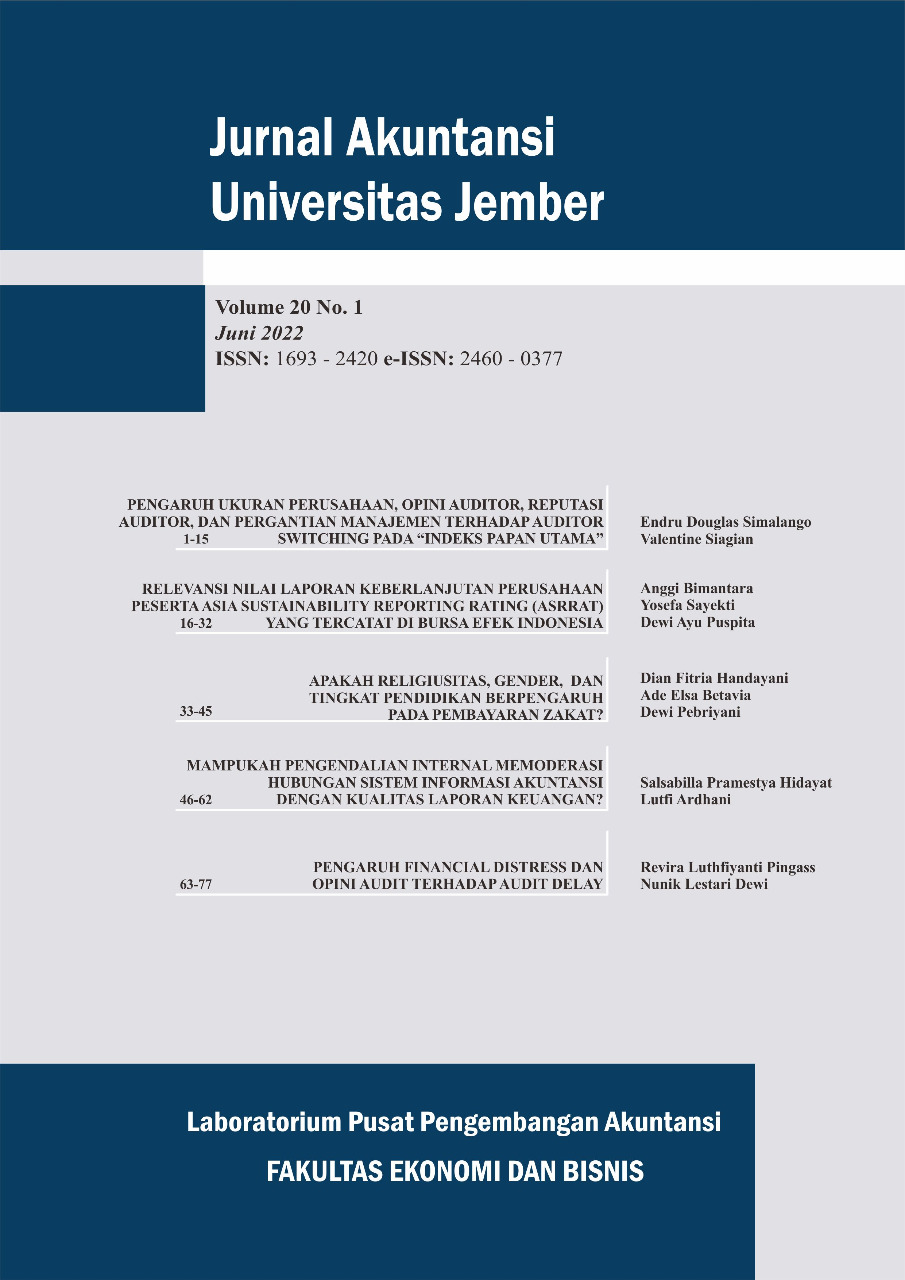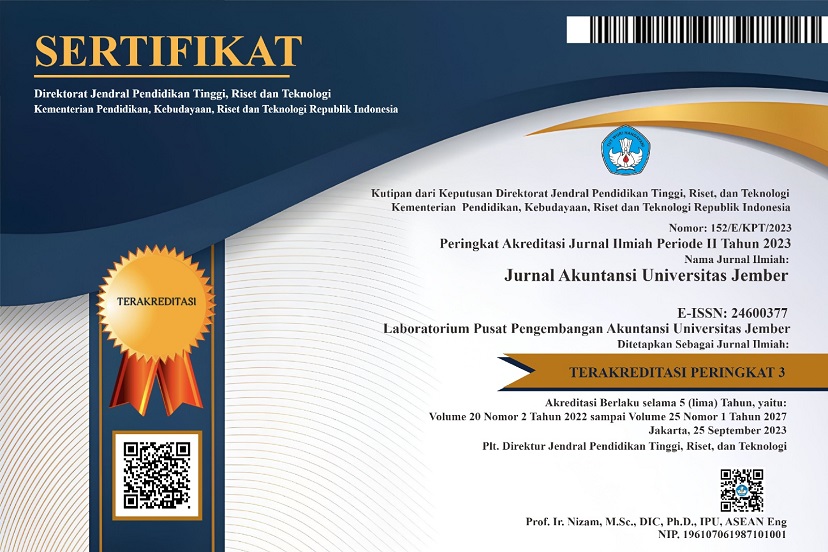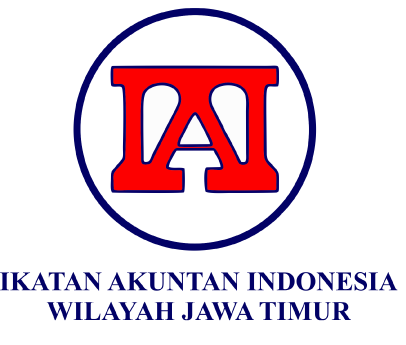RELEVANSI NILAI LAPORAN KEBERLANJUTAN PERUSAHAAN PESERTA ASIA SUSTAINABILITY REPORTING RATING (ASRRAT) YANG TERCATAT DI BURSA EFEK INDONESIA
DOI:
https://doi.org/10.19184/jauj.v20i1.30904Abstract
This study aims to examine and analyze an effect of the disclosure of sustainability reports and company ratings on the value relevance proxied by the Earning Response Coefficient of participating companies in the Asia Sustainability Reporting Rating (ASRRAT) listed on the Indonesia Stock Exchange. This research belongs to the quantitative type using secondary data, there are annual report and the sustainability report start from 2017 until 2019. The sample selection method in this study was purposive sampling and resulted in 38 research samples. This study uses sustainability report disclosure and company ranking for independent variable, size for control variable, and Earning Response Coefficient for dependent variable. This result showed that the disclosure of sustainability reports and company rating had no effect on the value relevance proxied by the Earning Response Coefficient of participating companies in the Asia Sustainability Reporting Rating (ASRRAT) listed on the Indonesia Stock Exchange. In addition, company size as a control variable also shows no effect on the value relevance proxied by the Earning Response Coefficient of participating companies in the Asia Sustainability Reporting Rating (ASRRAT) listed on the Indonesia Stock Exchange.
Keywords: Asia Sustainability Reporting Rating, Earning Response Coefficient, Sustainability Report, Value Relevance
ABSTRAK
Penelitian ini bertujuan untuk menguji dan menganalisis ada tidaknya pengaruh pengungkapan laporan keberlanjutan dan peringkat perusahaan terhadap relevansi nilai yang diproksikan dengan Earning Response Coefficient pada perusahaan peserta Asia Sustaianability Reporting Rating (ASRRAT) yang tercatat di Bursa Efek Indonesia. Penelitian ini termasuk ke dalam jenis kuantitatif dengan menggunakan data sekunder yakni laporan tahunan dan laporan keberlanjutan tahun 2017-2019. Metode pemilihan sampel pada penelitian ini yakni purposive sampling dan menghasilkan 38 sampel penelitian. Penelitian ini menggunakan variabel independen yakni Sustainability Report Disclosure dan peringkat perusahaan, variabel kontrol yakni ukuran perusahaan, dan variabel dependen yakni Earning Response Coefficient. Hasil penelitian menunjukan bahwa pengungkapan laporan keberlanjutan dan peringkat perusahaan tidak berpengaruh terhadap relevansi nilai yang diproksikan dengan Earning Response Coefficient pada perusahaan peserta Asia Sustainability Reporting Rating (ASRRAT) yang tercatat di Bursa Efek Indonesia. Selain itu, ukuran perusahaan sebagai variabel kontrol juga menunjukan tidak berpengaruh terhadap relevansi nilai yang diproksikan dengan Earning Response Coefficient pada perusahaan peserta Asia Sustainability Reporting Rating (ASRRAT) yang tercatat di Bursa Efek Indonesia.
Kata Kunci: Asia Sustainability Reporting Rating, Earning Response Coefficient, Laporan Keberlanjutan, Relevansi Nilai
Downloads
References
Astuti, P. W. (2020). Faktor-Faktor Yang Mempengaruhi Earning Response Coefficient. Prisma (Platform Riset Mahasiswa Akuntansi), 10-17.
Awuy, V.P., Sayekti, Y., & Purnamawati, I. (2016). Pengaruh Pengungkapan Corporate Social Responsibility (CSR) Terhadap Earning Response Coefficient (ERC) (Studi Empiris Pada Perusahaan Pertambangan yang Terdaftar di Bursa Efek Indonesia Pada Tahun 2010-2013). Jurnal Akuntansi dan Keuangan, 18, 15-26.
Barth, M. E., Beaver., W. H., & Landsman, W. R. (1968). The Relevance of Value Relevance Research. Journal of Accounting & Economic
Basalama, I. S., Murni, S., & Sumarauw, J S. (2017). Pengaruh Currrent Ratio, DER & ROA Terhadap Return Saham Pada Perusahaan Automotif & Komponen Periode 2013-2015. Jurnal EMBA, 5(2), 1793-1803.
Brigham, E. F., & Houston, J. F. (2018). Dasar-Dasar Manajemen Keuangan. Jakarta: Salemba Empat.
Freeman, R. E., & Philips, R. A. (2002). Stakeholder Theory: A Libertarian Defense. Business Ethics Quarterly, 12(3), 331-349.
Indriantoro, N., & Supomo, B. (2009). Metodologi Penelitian Bisnis untuk Akuntansi & Manajemen. Yogyakarta: BPFE-Yogyakarta.
Kasali, R. (2005). Manajemen Public Relation. Jakarta: Grafiti.
Kurnia, I., Diana., & mawardi, M. C. (2019). Pengaruh Pengungkapan Corporate Social Responsibility, Good Corporate Governance, Ukuran Perusahaan, dan Profitabilitas Terhadap Earning Response Coefficient (ERC). E-JRA, 8(1), 78-91.
Kustono, A. S. (2020). Performa Lingkungan dan Derajat Penyajian Informasi Lingkungan Perusahaan Non Keuanga Di Indoneisa. JIAI (Jurnal Ilmiah Akuntansi Indonesia), 5(2), 194-300.
Lindawati, A. S., & Puspita, M. E. (2015). Corporate Social Responsibility: Implikasi Stakeholder dan Legitimacy Gap dalam Peningkatan Kinerja Perusahaan. Jurnal Akuntansi Multiparadigma, 6(1), 157-174.
Martaningsih, D. (2017). Analisis Pengaruh Nilai dan Rating Penerbitan Obligasi Syariah (Sukuk) Terhadap Return Saham. Skripsi. 1-143.
Maulina, R., & Februari, C. P. (2018). Pengaruh Pengumuman Indonesia Sustainability Reporting Award (ISRA) Terhadap Abnormal Return Dan Volume Perdagangan Saham Serta Dampaknya Terhadap Perusahaan Peraih Dan Non Peraih Penghargaan. AKBIS Media Riset Akuntansi dan Bisnis, 57-70.
NCSR. (2021). ASRRAT. Diakses pada 23 Maret 2021, dari http://www.ncsr-id.org/asiasr-rating/.
Novianto, A., Efendi, K. C., & Purbokusumo, Y. (2021). The Politics of Virtue for Capital Accumulation: CSR and Social Conflict in the Construction of the Indocement Factory in Pati, Indonesia. PCD Journal, 9(2), 101-120.
Peraturan Otoritas Jasa Keuangan Nomor 51 Tahun 2017. Penerapan Keuangan Berkelanjutan Bagi Lembaga Jasa Keuangan, Emiten, Dan Perusahaan Publik. (18 Juli 2017). Lembaran Negara Republik Indonesia Tahun 2017 Nomor 169. Jakarta.
Redaksi. (2017). Sustainability Report (SR) di Indonesia Sepi Peminat. Jakarta: Majalah CSR.
Rusdin. (2016). Pengungkapan Corporate Social Responsibility (CSR) dan Implikasinya Terhadap Earning Response Coefficient. AdBispreneru, 2(1), 153-164.
Saragih, M. R., & Rusdi. (2020). Menguji Faktor Yang Menjadi Determinan Bagi Earning Response Coefficient Pada Perusahaan Real Estate Dan Properti Di Indonesia. Scientific Journal of Reflection, 3(2), 191-200.
Sayekti, Y., & Wondabio, L. S. (2007). Pengaruh CSR Disclosure Terhadap Earning Response Coefficient (Suatu Studi Empiris Terhadap Perusahaan yang Terdaftar Di Bursa Efek Jakarta). Simposium Nasional Akuntansi X, 1-36.
Spence, M. 1973. Job Market Signaling. The Quarterly Journal of Economics, 87(3), 355-374.
Sudarsono, B., & Sudiyatno, B. (2016). Faktor-Faktor Yang Mempengaruhi Return Saham Pada Perusahaan Property & real Estate Yang Terdaftar Di Bursa Efek Indonesia Tahun 2009-2014. Jurnal Bisnis dan Ekonomi (JRE), 23(1), 30-51.
Suwardika, I. A., & Mustanda, I. K. (2017). Pengaruh Leverage, Ukuran Perusahaan, Pertumbuhan Perusahaan, dan Profitabilitas Terhadap Nilai Perusahaan Pada Perusahaan Properti. E-Jurnal Manajemen Unud, 63, 1248-1277.
Tandelilin, E. (2017). Pasar Modal Manajemen Portofolio & Investasi. Yogyakarta: PT Kasinus.
Tulhasanah, D., & Nikmah. (2017). Pengaruh Corporate Social Responsbility (CSR), Kualitas Auditor, dan Ukuran Perusahaan Terhadap Earning Response Coefficient (ERC). Jurnal Manajeen dan Akuntansi, 20(1), 83-95.


















